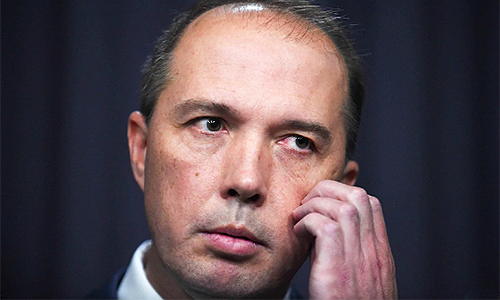
by PAUL COLLITS – LEFTIE ABC reporter Daniel Ziffer – not a household name – wrote a book in 2019 called A Wunch of Bankers: A Year in the Hayne Royal Commission.
One friendly critic called it “wucking funderful”.
- These groups start with homosexuals, “people of colour”, “first nations” people and the “transgendered”.
- We are now only very, very short steps from full-blown social credit, Chinese Communist Party style.
- Shouldn’t banks just be about, well, banking?
Justice Kenneth Madison Hayne, the retired High Court judge, did a great, indeed, a heroic job of defenestrating Australia’s protected banker class for their many crimes against their customers, exposing the crooks and shysters we all knew existed in that industry. A few bad apples? Maybe.
They got up to all sorts. Charging fees to dead people. Ignoring conflicts of interest. Taking a billion in fees from customers that they weren’t entitled to. Book reviewer “Sammy J” spoke of the “barren soul of the banking industry”. Indeed.
EX-BANKER
The bankers resisted a Royal Commission with all their might. They were helped, no doubt, by the fact that the then government was led by an ex-banker.
One Malcolm Turnbull, who, sadly, just won’t shut up these days.
Nationals including John “Wacka” Williams, another hero in the tradition of old Nats like Ron Boswell, insisted that Turnbull cave and allow the Royal Commission. Eventually, he did.
It seems an age since large corporates had the remotest concern for their customers. Just think unattended queues in store, call centre staffed by foreigners you can’t understand, CCTV surveillance of customers, price gouging, collusion, using automation to make customers do the former work of the employees and the rest.
This is ironic, since their primary concern in life now seems to be “reputational risk”.
While not giving a fig about individual customers, they seem bent on leaving no stone unturned in their quest to please customer “groups”.
PRIDE
Especially homosexuals, “people of colour”, “first nations” peoples and the “transgendered community”. People of pride, you might say.
All this has come to the fore these past weeks in Britain. This has been almost the only story making headlines over there. We even have a new word – “debanking”.
Almost unbelievably, it has come to the public’s attention that banks have been cancelling customers’ accounts for their personal views.
An obscure bank called Coutts, a subsidiary of another bank not so obscure, NatWest, has been at it.
Most infamously, it was Nigel Farage. But not only him. All sorts of stories are emerging. A British vicar has been debanked.
An Anglican church leader has slammed Yorkshire Building Society (YBS) after he pushed back against the company’s alleged pushing of transgender ideology.
Rev Richard Fothergill had held an account there for 17 years before writing what he called a polite rebuttal of their promotional output during Pride month this June.
Meanwhile, NatWest’s FTSE index share price has (mercifully) gone through the basement floor. It is, to borrow from Tamie Fraser, lower than a snake’s duodenum.
The CEOs of both Coutts (an Aussie, no less) and NatWest have been forced to resign. Dame Alison Rose won’t be collecting her annual £10m salary, any more.
A bit of reputational risk, right there. The Board is under pressure. Part of the problem is that Dame Alison Rose admitted to having leaked Nigel Farage’s private information to the BBC.
The BBC even double-checked with the Bank that it was ok to publish. That’s illegal, isn’t it?
Here is Nigel Farage: “I believe Coutts targeted me on personal and political grounds, for its report reads rather like a pre-trial brief drawn up by the prosecution in a case against a career criminal. Monthly press checks were made on me. My social media accounts were monitored. Anything considered “problematic” was recorded. I was being watched.
PROOF
“This report is proof that any Coutts customer who holds even vaguely conservative views should be treated with disdain. My friendship with the family of Novak Djokovic, who stood firm over his belief that he should have the freedom to choose whether to receive the COVID vaccine, is mentioned on the charge sheet…
“At all times, the report’s tone is accusatory and reproachful. The fact that Brexit is mentioned on 86 occasions perhaps tells us all we need to know.”
As US author Tom Woods notes, quoting The Telegraph: “The Coutts papers read as if written by gullible schoolchildren with a Marxist teacher. Criticising BLM is ‘inciting race hate”]’. Wikipedia is cited as if it were a reliable source – as is the far-Left boycott group Hope not Hate. Even the repeated comment that Farage is ‘polite to staff’ is revealing, as if they find it surprising from someone with his opinions.
“The report in question was produced at Farage’s request, since he has a right to see the personal information they held about him. The resulting 40 pages contained criticisms of his political opinions, some of which the Bank described as ‘distasteful and appear increasingly out of touch with wider society’.”
We are now only very, very short steps from full-blown social credit, Chinese Communist Party style. Who or what will prevent it in this compliant-rich times, one can but wonder?
There are many angles on this story. So many things to worry about that one hardly knows where to start.
Frederick Edward at The Conservative Woman (TCW) notes, for example: “Take, for example, the debacle regarding Nigel Farage and Coutts bank. Until 2022 NatWest Group – Coutts’s parent – was majority-owned by the taxpayer, needing to be subsidised by the public because of its serious business failings.
CEO
“Today it is still 38.6 per cent owned by the government. It was nobody less than the CEO of NatWest Group who passed inaccurate information to a BBC journalist (another State-owned institution) to smear the reputation of one of the most successful politicians in recent British history.”
His point is about the unity ticket that is the modern relationship between the State and the media. One might just as easily focus on the Fact Checker Industrial Complex (FCIC).
One branch of the FCIC is the silencing branch. This is alive and well in Canberra.
ACMA (the Australian Communications and Media Authority), our very own communications regulator was active on Peter Dutton’s watch, getting anti-vaccine mandate voices shut down, and now we have Albanese’s Ministry of Truth bill. The Brits, as we know from Mark Steyn, have Ofcom.
Then there is the banning branch. This is what the British wunch of bankers attempted with Farage. Ban him as a customer.
Prepare a forty-page dossier on him, outlining his thought crimes that do not “align” with the bank’s corporate values of inclusion, or whatever.
Then cancel his accounts with the bank. In happier times, no one gave a flying fig what bankers thought about homosexuals of “people of colour”, and no one knew where celebrities and politicians banked. Happy times.
A legitimate question that might be posed by bank shareholders is – how much do they spend on these teenage fact checkers, none of whom are likely ever to have heard of George Orwell, let alone been worried about his message?
Another point is that banks and other corporates have been doing this for yonks, without anyone really knowing.
The incomparable UK commentator Katie Hopkins hasn’t been able to get a mortgage for decades. Her children have to use false names to find a school that will have them.
OBVIOUS
The most obvious angle is – shouldn’t banks just be about, well, banking?
The fact that even British cabinet ministers have been taking to Twitter to support Farage – their greatest political threat and enemy – suggests that, this time, the woke corporates might just have gone too far.
Up until now, they have believed that they can simply do anything they please, to anyone, at any time. If the politicians are up in arms, it means that we-the-people are up in arms. That is how it works.
Perhaps we-the-people should try kicking up a fuss more often. Especially when the perps are just a wunch of bankers.
Let Professor Wanjiru Njoya of the University of Exeter have the final word: “Almost all the defenses of free speech and the argument that people’s bank accounts should not be canceled for their opinions begin with a progressive caveat – ‘I don’t agree with Farage, but…’. Which is a way of saying ‘Please, Lefties, don’t cancel me, too’. Everyone is afraid….
“Rights stand on their own. Everyone has a right to free speech. There’s no presumption that if you defend free speech you agree with and admire what’s said. Progressive caveats reverse that presumption. Now unless you begin with a caveat it’s presumed you agree with the speaker.
“Moreover, if everyone begins with, ‘I’m no fan of Mr Farage, but…’ how is that different from what the bank said in their Stasi-style dossier, where they made it clear they’re no fans of Mr Farage, either? Mr Farage is not on trial here. Everyone doesn’t have to denounce him.”
Indeed. Virtue signalling and calling on Voltaire at the same time.
It is often said, rightly or wrongly, that free speech is the first and greatest freedom. Sad to say that a recent American poll showed that over half (55 per cent) of those asked thought that shutting down first amendment rights was quite okay, in the cause of silencing “misinformation”. That word again.
It is abundantly clear that we live in Chinese times.PC













Nigel should have spoken up for Katie Hopkins et al, maybe then I’d care more when they came for him.
“We are now only very, very short steps from full-blown social credit, Chinese Communist Party style.”
I think that we already have the Communist bit with Albanese. The population just doesn’t know about it yet, which is typical of creeping totalitarianism.
Yes!
“The most obvious angle is – shouldn’t banks just be about, well, banking?
The fact that even British cabinet ministers have been taking to Twitter to support Farage – their greatest political threat and enemy – suggests that, this time, the woke corporates might just have gone too far.”